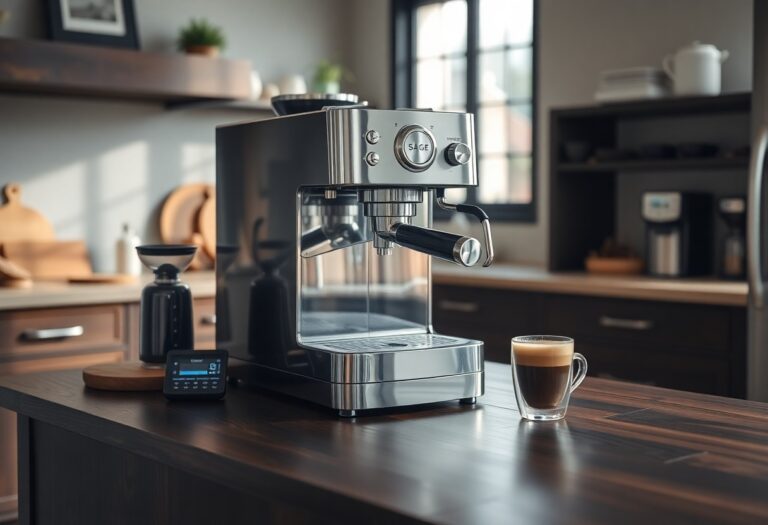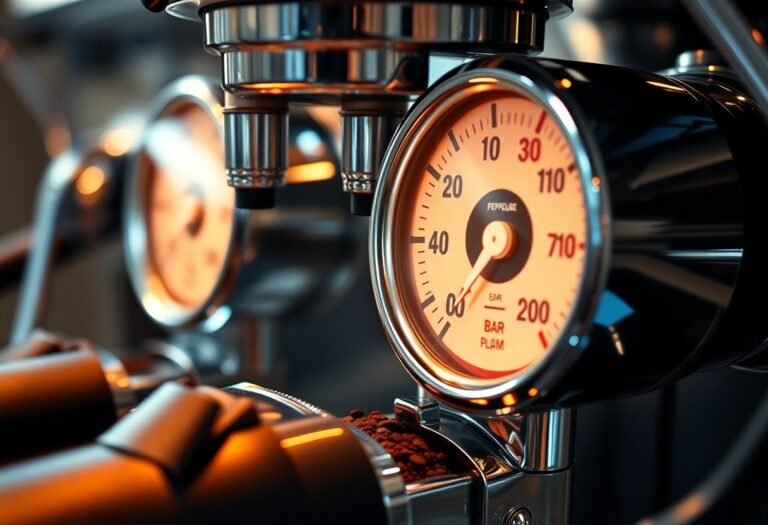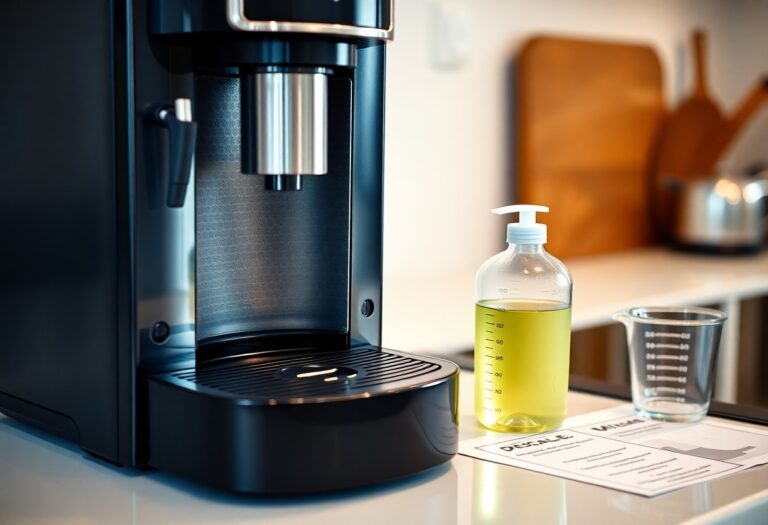What is Descaling in a Coffee Machine – Process Definition
It’s crucial to understand that descaling your coffee machine is a necessary maintenance process that removes mineral buildup, particularly from hard water, that can affect its performance and the quality of your brew. When you regularly descale, you ensure that your machine operates efficiently, enhancing the flavor and aroma of your coffee while prolonging the life of the appliance. Without descaling, you’re risking diminished taste and potential damage to your machine, which can lead to costly repairs or replacement. Taking care of your coffee machine with this simple process can significantly impact your coffee experience.
Key Takeaways:
- Descaling is the process of removing mineral buildup, primarily calcium and lime, from the internal components of a coffee machine.
- This buildup can affect the machine’s performance, leading to slower brewing times and compromised flavor quality in the coffee.
- Descaling is typically recommended every 1 to 3 months, depending on the water hardness and usage frequency of the coffee machine.
- The descaling process usually involves a descaling solution or vinegar mixed with water, which is run through the machine to clean the internal parts.
- Many coffee machines come with specific instructions for descaling, and using the manufacturer-recommended products can help prolong the machine’s lifespan.
The Chemical Culprit: Understanding Limescale
Limescale, a stubborn mineral buildup, emerges primarily from hard water, containing high levels of calcium and magnesium. When heated, these minerals precipitate and form deposits inside your coffee machine. Over time, this accumulation can hinder performance and become a persistent issue that affects not just the machine, but the quality of your coffee as well.
The Science of Limescale Formation
Limescale forms as water is heated and evaporates, leading to a concentration of dissolved minerals. Typically, water with a hardness rating above 120 mg/L is at risk for limescale deposits. These deposits can occur in the boiler, water pipes, and even in the brewing unit, where they obstruct the flow of water and compromise your coffee machine’s efficiency.
Impact of Limescale on Coffee Quality
The presence of limescale can significantly alter the taste and aroma of your coffee. As mineral deposits build up, they restrict the water flow, leading to inconsistent brewing temperatures and an uneven extraction process. Ultimately, you may find your coffee tasting bitter or overly acidic, losing the rich flavors intended from your chosen beans.
In fact, studies show that even a small amount of limescale can affect the extraction efficiency, potentially reducing the flavors you enjoy. For instance, the brewing temperature may drop below the ideal range of 195°F to 205°F, resulting in under-extraction or overheating, which can impart unpleasant flavors. Regular descaling keeps your machine operating at optimal conditions, preserving the integrity and richness of your coffee experience.

Decoding the Descaling Process
The descaling process involves using specific solutions to remove limescale buildup within your coffee machine. The accumulation of minerals from water can lead to performance issues, affecting the flavor and extraction quality of your coffee. For comprehensive insights into whether you should Descale an Espresso Machine – Yes or No, you can explore community discussions.
Common Descaling Agents and Their Effectiveness
Common descaling agents include citric acid, vinegar, and commercial descaling solutions. Citric acid is effective in dissolving mineral deposits without compromising the machine’s components, while vinegar can be effective but may leave residual odors. Commercial solutions are formulated to provide optimal results but could be more costly. Each option varies in effectiveness based on the mineral content in your water.
Step-by-Step Descaling Techniques
The descaling process generally follows a systematic approach, which ensures comprehensive cleaning and restoration of your coffee machine. You can follow the sequential steps outlined in the table below to effectively descale your machine:
| Step | Action |
| 1 | Prepare a descaling solution as per manufacturer’s instructions. |
| 2 | Fill the water reservoir with the solution. |
| 3 | Run a brewing cycle without coffee in the machine. |
| 4 | Let the machine sit for the recommended dwell time. |
| 5 | Flush the machine with clean water multiple times to remove any remaining solution. |
Be thorough during the flushing step to ensure all traces of the descaling solution are removed. This step is vital for maintaining the integrity of your coffee machine and ensuring that you don’t end up with any unpleasant flavors in your brew. Note that the frequency of descaling can depend on water hardness and usage levels, so pay attention to your machine’s indicators for optimal maintenance.
Signs Your Coffee Machine Needs Descaling
Identifying when your coffee machine requires descaling can save you time, money, and energy. Common signs include prolonged brewing times, poor-tasting coffee, or a noticeable decrease in your machine’s efficiency. If you notice any of these symptoms, it may be time to give your coffee machine some TLC through descaling.
Visual and Operational Indicators
Keep an eye out for visual clues such as white residue around the water reservoir or ports, which signifies limescale buildup. You might also experience operational issues like slow water flow or odd noises during the brewing cycle. Both of these signs indicate that your coffee machine’s internal components are likely affected by mineral deposits, suggesting it’s time to descale.
The Long-Term Costs of Neglect
Overlooking the need for descaling can result in significant long-term costs, both financially and functionally. Ignoring mineral buildup can strain your machine, leading to potential breakdowns or the need for costly repairs. Given that a simple descaling routine can extend the life of your equipment, investing in regular maintenance not only protects your coffee maker but also ensures consistent quality in your morning brews.
Failure to descale your coffee machine can lead to serious problems, such as pump failure or heating element malfunctions, which might necessitate a full replacement. Depending on the model, repairs can range from $50 to several hundred dollars, while a simple descaling solution often costs less than $10. Investing time in regular descaling not only preserves your machine’s lifespan but also enhances the quality of your daily coffee ritual.

Preventative Measures: Keeping Your Coffee Machine in Top Shape
Your coffee machine deserves the best care to ensure each cup is brewed to perfection. Implementing simple, consistent preventative measures can significantly extend the life of your appliance and enhance the flavor of your coffee. Regular cleaning, proper storage, and mindful usage habits contribute to a machine that’s always ready to deliver. The key to a great cup of coffee is investing time in maintaining your machine.
Regular Maintenance Tips
Conducting regular maintenance will help stave off issues with your coffee machine down the line. Undertake the following tasks:
- Perform daily cleaning of removable parts
- Run a water-only cycle weekly to prevent buildup
- Store your machine in a dry area to prevent moisture damage
The routine maintenance tasks keep your coffee machine functioning optimally and ensure consistent quality in every brew.
Choosing the Right Water: The Soft vs. Hard Debate
Selecting the right water for your coffee machine can impact both the taste of your brew and the longevity of your appliance. Using soft water reduces limescale buildup, meaning less frequent descaling. However, hard water can enhance flavor profiles but may lead to increased wear and tear on your machine. Balancing water types can yield the best overall results in taste and durability.
In the ongoing battle of soft vs. hard water, soft water tends to cause fewer problems with limescale while preserving the essence of various coffee blends. If your area has hard water, consider utilizing a filtration system or adding descaling agents to your routine to mitigate potential issues. By doing so, you not only enhance the flavor of your coffee but also protect your investment and ensure years of quality brewing. Finding a balance that suits your taste preferences and maintains your machine’s efficiency is key.
The Future of Coffee Machines: Innovations in Descaling Technology
As coffee machines evolve, so do descaling solutions. New innovations are emerging that streamline the descaling process, making it more effective and less of a chore. Smart coffee makers now enable users to monitor their machines through apps, alerting you when it’s time to descale. For detailed instructions, check out How to Descale your Keurig® Coffee Maker. These advances are paving the way for a cleaner, more efficient brewing experience.
Built-In Descaling Features
Many modern coffee machines come equipped with built-in descaling features that simplify maintenance. Some machines have automatic reminders that notify you when descaling is necessary, while others include integrated descaling cycles. These advancements allow you to maintain optimal performance without handling separate descaling solutions constantly.
The Role of Smart Technology in Maintenance
Smart technology plays a significant role in enhancing coffee machine maintenance. With the integration of IoT (Internet of Things), coffee makers can now connect to your smartphone or smart home system, providing real-time updates and diagnostics. This means you can monitor not just the descaling needs but overall machine performance, ensuring that your coffee is brewed with the best quality every time.
By leveraging advanced algorithms and user data, smart coffee machines can even recommend the best descaling solutions based on your brewing habits. This predictive maintenance approach not only prolongs the life of your machine but also ensures a superior coffee experience. Additionally, some models allow for remote troubleshooting, enabling you to resolve issues without waiting for customer support. Embracing these technologies ensures that you can enjoy your daily brew without the hassle of machine upkeep, keeping your focus on savoring each cup.
Conclusion
On the whole, descaling your coffee machine is an necessary maintenance process that removes mineral buildup, ensuring optimal performance and flavor in your brews. By regularly engaging in descaling, you prolong the life of your machine and enhance the quality of your coffee. This straightforward procedure not only improves efficiency but also saves you from potential costly repairs in the future. Make descaling a part of your routine to enjoy consistently great coffee and keep your machine running smoothly.
FAQ
Q: What is descaling in a coffee machine?
A: Descaling is the process of removing mineral build-up, primarily calcium and lime deposits, from the internal components of a coffee machine. This build-up occurs over time due to the minerals present in water, and it can affect the performance and longevity of your coffee maker.
Q: Why is descaling important for coffee machines?
A: Descaling is important because mineral deposits can hinder the machine’s ability to heat water efficiently, which can result in less optimal brewing temperatures and poorly extracted coffee. Regular descaling helps to maintain the machine’s performance and ensures better tasting coffee.
Q: How often should I descale my coffee machine?
A: The frequency of descaling depends on how often you use your coffee machine and the hardness of your water. Generally, it’s recommended to descale every 1-3 months for machines used daily. If you notice slower brewing times or unusual sounds during operation, it might indicate that descaling is needed sooner.
Q: What methods can I use for descaling my coffee machine?
A: Common methods for descaling include using commercial descaling solutions specifically formulated for coffee machines or creating a natural descaling solution using equal parts of water and white vinegar. Consult your coffee machine’s user manual for specific recommendations on descaling agents and methods.
Q: Can descaling affect my coffee machine warranty?
A: Many coffee machine manufacturers require regular maintenance, including descaling, to keep the warranty valid. If you fail to descale and it leads to damage, the warranty may be voided. Always check the warranty terms provided by the manufacturer for detailed information regarding maintenance requirements.







